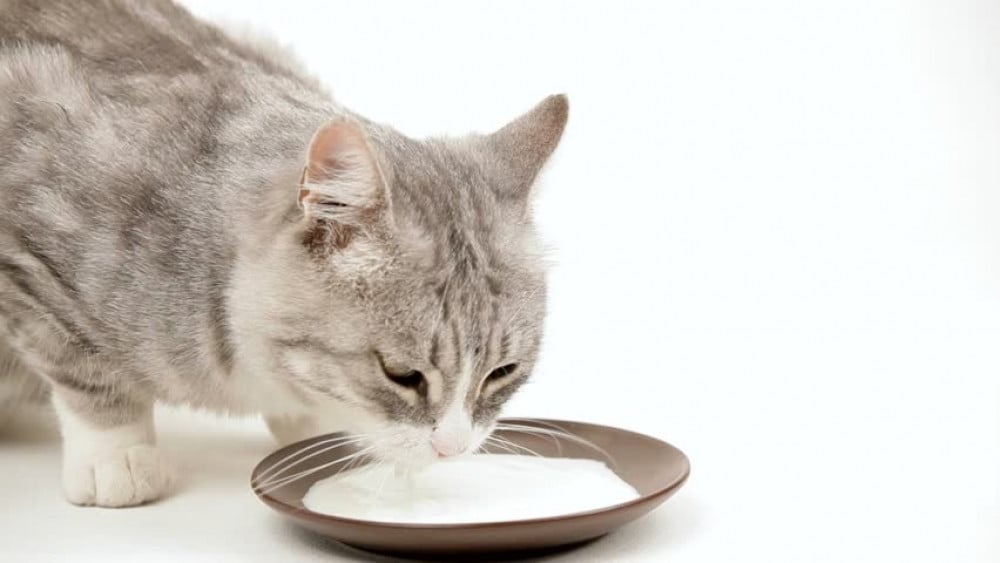Lactose-free milk for cats
- Giving a cat a bowl of milk is a familiar image; And you might think that giving your cat or kitten a bowl of milk would be one of her favorite meals, because cats and milk have always been paired in paintings, cartoons, and storybooks. However, many cats are intolerant to the lactose in milk. Although cats can drink lactose-free or lactated-free milk, there are specific lactose-free milk products that are suitable for cats and represent the healthiest option for them.
Milk, kittens and the beloved meal superstition
Can cats drink milk? Is milk good for cats? Is milk harmful to cats? In this topic we will go deeper and give the right answers to these little questions.
Although cats may like the taste of milk, it turns out that dairy products aren't the best choice for cats, even though they love the flavor. And while most cats can tolerate a small amount of milk, it should not be their main source of nutrition for several reasons. And for lactose intolerant cats, milk is a poor choice for hydration.
A bowl of milk for a cat is the caloric equivalent of a human eating a 12-inch pizza on his own. If you eat a 12-inch pizza every day, you are likely to gain unwanted pounds, and the same goes for your cat who eats a daily bowl of milk.

Can cats drink milk?
While some cats can tolerate milk, they are often lactose intolerant. Kittens can drink the milk produced by their mothers, as it is specially prepared for their nutritional needs and digestive system. However, as kittens get older, they lose their ability to tolerate milk. This is similar to humans as they age. This is because as kittens mature after weaning, they don't produce an enzyme called lactase, which helps digest milk sugars.
Symptoms to watch for when cats drink milk
If your cat is drinking milk, you may see symptoms such as vomiting, diarrhea, flatulence, constipation, and general stomach upset. Again to make an analogy, it's just how lactose intolerant humans feel when they consume dairy products. Adult cats have no nutritional need for milk, so veterinarians advise against giving it to your cat, even if your cat appears to be consuming it without gastrointestinal upset. Even bottle-fed, lactose-tolerant cats are given formula they can digest instead of whole milk. Milk is also high in fat and calories, so cats who drink it are at risk of becoming overweight.
Milk substitutes for kittens and kittens
There are lactose-free milk products made specifically for cats , many lactose-free milk products, for small cats and adult cats, and wet cat food products with goat milk, suitable for cats are available on the Seventh Bird store, and the products were specially chosen to suit your cats and do not cause them any symptoms of discomfort or Intolerance to milk.
These are lactose-free milk products that also contain taurine, an amino acid that cats need, in addition to other vitamins and minerals. They are better options for cats than other types of milk, such as cow's milk, for example.
Avoid human milk substitutes
Lactose-free milk intended for humans is not suitable for cats either. There are other types of milk sold to humans, such as soy milk and almond milk, and while they are beneficial for people with lactose intolerance, they are not suitable for the digestive system of cats due to their sugar content.
Can cats drink Lactaid?
We mentioned that the "milk is good for cats" myth is just a myth spawned from the media, that milk upsets your cat's stomach and even some lactose-free milks like Lactaid can put them at risk of obesity. If you are determined to give your cat milk, use a lactose-free milk product made specifically for cats, and always make sure your cats get plenty of water as well.
Check out specially formulated wet cat foods on the Seventh Bird store
What are the symptoms of lactose intolerance in cats
Most cats may like the flavor of milk, but milk doesn't always like it. Some cats are completely lactose intolerant. In these cats, a deficiency of the lactase enzyme causes them to be unable to digest milk. Their digestive systems try to expel the milk, causing your cat to have diarrhea, and the undigested lactose in the intestines attracts bacteria. The sugar in lactose ferments, causing painful gas and an increase in stomach acid.
Symptoms of lactose intolerance in cats include symptoms that are very annoying to cats, including:
- Stomach ache
- bloating
- Diarrhea
- vomiting
- holding
- drought
- extreme thirst
- Increased heart rate
If you give your cat milk and then notice these symptoms, it is likely that your cat is lactose intolerant and should not be given milk most of the time. Cats who are lactose intolerant may have other problems with milk, such as: an allergy to casein or milk protein, or an intestinal condition that makes them unable to digest milk. Sometimes you may want to give your cat a bowl of milk, but this may cause her digestive problems such as vomiting and diarrhea.
Conclusion
Not only is milk high in calories, but cats also can't always digest milk well, or sometimes at all. Milk alternatives such as plant-based milks can also cause digestive problems in cats or cause weight gain. Your cat may look cute when sucking milk from the dish, but the problems that milk can cause her are not cute at all. There are milk products for cats that are made with lactose-free milk and suitable additives that are specially prepared for cats.


